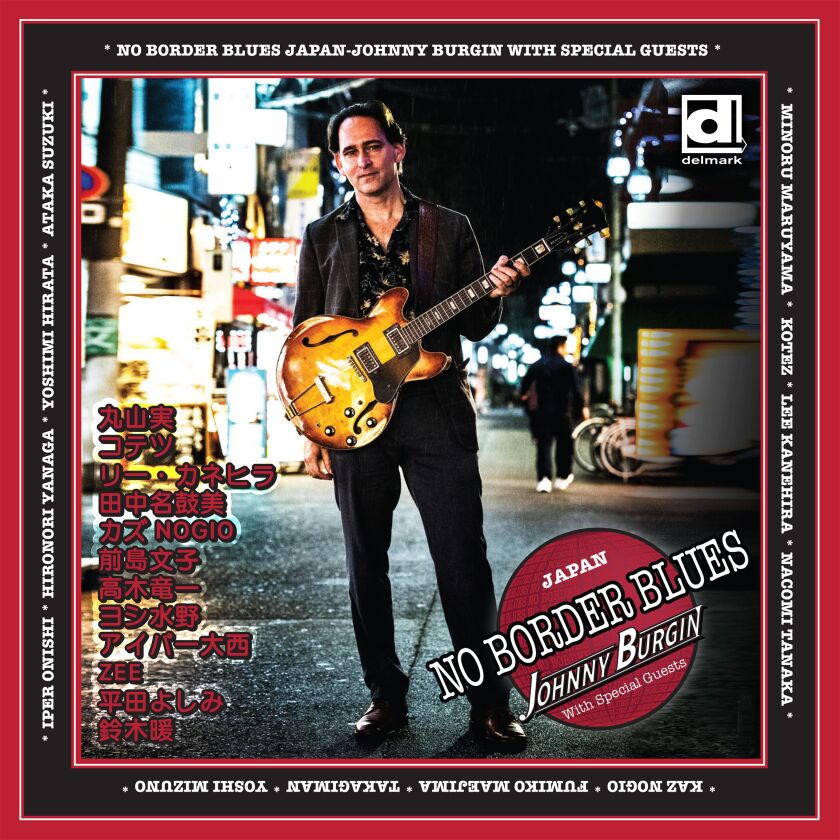Blues singer Johnny Burgin’s latest album highlights a part of the genre’s history that is largely unknown to a swath of its fans: Japanese blues music.
And that unknown is now on full display.
Due to the number of tours that many of Chicago’s blues artists such as Jimmy Dawkins, Otis Rush, Eddie Taylor and Jimmy Johnson played on since the 1970s, a group of Japanese artists who are influenced by them were brought on to create “No Border Blues Japan,” a compilation album — the first of its kind — of the favorite musicians of Johnny Burgin, a Chicago-based blues artist.
“I was playing with these [musicians] because they’re such traditional Chicago players and my partner Stephanie [Tice] was traveling with me and said, ‘You got to make a record with these guys; we got to show these people off to the American blues audience,’ ” said Burgin, who first went to Japan to perform in 1996. “So the next time I came back, that’s what we did. I just think they put so much into the history of blues; they’re playing it at such a high level.”
The album, which is Burgin’s ninth studio album, features Japanese blues artists such as pianist Lee Kanehira, guitarist Nacomi Tanaka, drummer Fumiko Maejima and bassist Hironori “Zee” Yanaga, among others.
The 11-track compilation closes out with “Sweet Home Osaka,” an homage to blues legend Robert Johnson’s “Sweet Home Chicago.”
The album was recorded in 2019 at Osaka’s Fukada Studios and was mixed and mastered at Delmark’s Riverside Studios in Chicago.
The impetus of “No Border Blues Japan,” which was released in the States last month on Delmark Records, was born of the number of tours by Chicago blues artists to Japan since the 1970s.
“Delmark was right there with that Otis Rush record [1977’s ‘So Many Roads: Live in Concert’],” said Burgin. “That’s why some of the Japanese players got started. That’s why they became really rabid fans. And so those people became the first Japanese blues musicians; basically three generations of players gravitated to this Chicago sound thing. The originators came, and it left a big impression on them.”
The album is resonating with American audiences.The compilation is No. 1 on the Roots Music Report Chicago Blues Chart and No. 5 on the Living Blues Radio Charts.
“It’s getting a lot of airplay,” said Burgin. “So there’s some Japanese accents and stuff like that and some people don’t like it, but people always want to listen to it, to check it out. People’s curiosity … personally, people do like the blues all over the world, and I don’t think recognition should be based on if you speak English without an accent.”
Burgin says the artists gained the respect of the blues community.
“Yeah, it happened through Delmark,” said Burgin. “That label is a North Star of authentic blues to [Japanese blues artists]. It’s a real deal that’s been essential blues listening for decades; I still can’t believe it. They play in these places that are little, white houses. Most of them play their neighborhoods, or with their friends in places that can only fit 20 or 30 people.”
Kanehira, who is featured on the complilation, calls her appearance “an honor.” Her inspirations include Leroy Carr, Otis Spann, Memphis Slim and Barrelhouse Chuck.
“There were some big blues festivals inviting musicians from the U.S. such as Muddy Waters, B.B. King, Eddie Taylor, James Cotton [and] Otis Rush etc.,” said Kanehira, who lives in the Kanagawa Prefecture [district] near Toyko. “Now we have only one big blues festival called the Japan Blues Festival inviting musicians from Chicago every year. Also, we have some local, small festivals here and there.
“I’m so honored to be a part of the album. It’s great that people from all over the world would know about Japanese blues players who had never been heard.”







